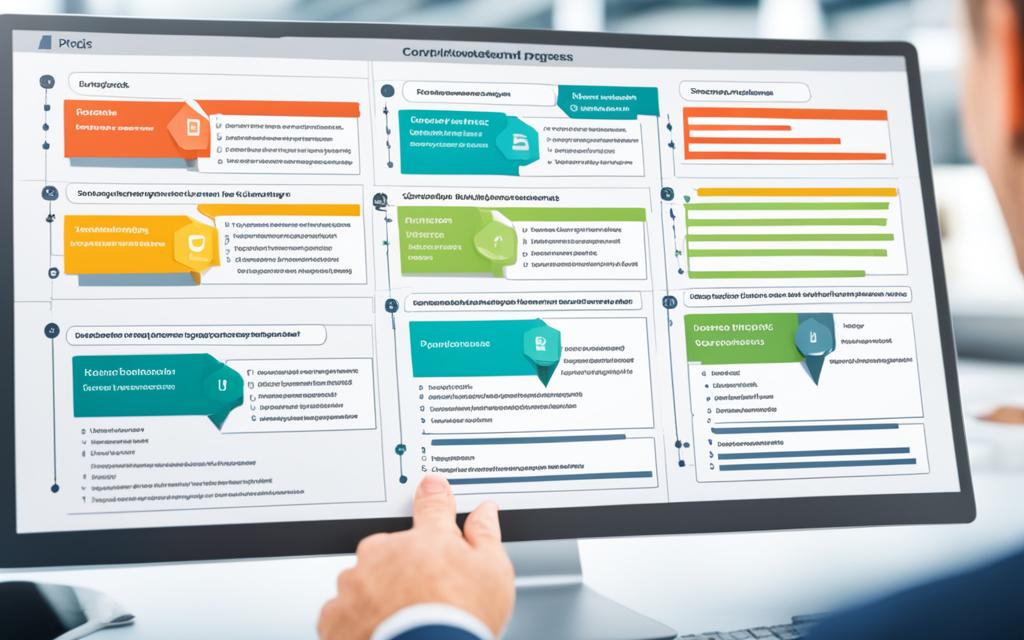The Role of Documentation: Oppugning Its Importance in Projects
Is project documentation really that important? Some might argue that it’s just a tedious task that adds unnecessary paperwork to projects. But let’s take a moment to delve into the significance of project documentation.
Project documentation is more than just a collection of papers or digital files. It serves as the guiding light, the roadmap that steers projects in the right direction. Without it, projects veer off course, becoming a chaotic mess of confusion and delays.
Imagine trying to build a house without blueprints or schematics. It would be a recipe for disaster, with workers stumbling over each other, unsure of what needs to be done next. The same applies to projects of any scale.
With proper documentation, stakeholders can understand the project’s goals, activities, and progress. They have a reference point to turn to when questions arise or decisions need to be made. Documentation provides clarity, ensuring that everyone is on the same page from start to finish.
Furthermore, project documentation is essential for tracking milestones and ensuring that projects stay on track. It allows project managers to monitor progress, identify potential roadblocks, and make necessary adjustments. Without documentation, projects can quickly spiral out of control, missing deadlines and objectives.
But documentation doesn’t just benefit the current project; it sets the stage for future endeavors. It provides a repository of knowledge and insights that can be leveraged for future projects, saving time, effort, and resources. By documenting lessons learned and best practices, teams can avoid repeating past mistakes and build upon previous successes.
So, the next time you find yourself hesitant to dive into project documentation, remember its crucial role in project success. It’s not just paperwork; it’s the foundation that keeps projects organized, efficient, and ultimately, successful.
The Benefits of Effective Project Documentation
Effective project documentation offers numerous benefits to project managers and teams. Firstly, it enhances communication by providing a common reference for all stakeholders involved in the project. This helps to ensure that everyone is on the same page, reducing misunderstandings and conflicts. Additionally, documentation promotes accountability by creating a clear record of responsibilities and deliverables. It allows project managers to track progress, identify potential issues, and take appropriate actions. Documentation also improves decision-making by providing relevant information and data to support informed choices. It helps to identify risks, dependencies, and constraints, enabling project managers to mitigate them effectively.
Moreover, documentation facilitates knowledge transfer and continuity by capturing lessons learned, best practices, and organizational knowledge. This allows future projects to benefit from past experiences and avoid repeating mistakes. By leveraging the accumulated knowledge and expertise, teams can make more informed decisions, avoid pitfalls, and drive continuous improvement.
“Effective project documentation acts as a compass, guiding the project team towards success.”
Furthermore, comprehensive project documentation serves as a reliable source of information for audits, regulatory compliance, and legal issues. It helps to demonstrate adherence to industry standards, regulatory requirements, and contractual obligations, reducing risks and ensuring project success.
Overall, effective project documentation is essential for project management success. It enables clear communication, fosters collaboration, ensures accountability, supports informed decision-making, facilitates knowledge sharing, and promotes continuous improvement. To unlock these benefits, project managers should adopt best practices in creating and maintaining project documentation.
Benefits of Effective Project Documentation:
- Enhances communication and reduces misunderstandings
- Promotes accountability and tracking of progress
- Facilitates informed decision-making and risk identification
- Enables knowledge transfer and continuity
- Supports audits, compliance, and legal requirements
By harnessing the power of effective project documentation, project managers can steer their projects towards success and ensure smooth project execution.
Real-Life Example: How Effective Documentation Saved the Day
When faced with a complex software development project, the team at XYZ Inc. relied on meticulous project documentation to navigate through challenges and achieve their goals. By documenting the project requirements, technical specifications, and design decisions, the team established a common understanding and facilitated collaboration between the development team, stakeholders, and quality assurance team.
Moreover, the documentation served as a comprehensive reference that allowed them to efficiently manage changes, track progress, and identify potential risks. When unexpected technical issues surfaced, the team was able to quickly consult the documentation, locate the root cause, and implement the necessary fixes without disrupting the project timeline.
Thanks to their effective project documentation practices, XYZ Inc. successfully delivered the software solution on time and within budget, exceeding client expectations. The documentation not only played a crucial role during the project’s lifecycle but also served as a valuable asset for future projects, enabling the organization to build upon their successes and continuously improve their software development practices.
| Benefits of Effective Project Documentation | Real-Life Example |
|---|---|
| Enhances communication and reduces misunderstandings | Documentation established a common understanding between teams at XYZ Inc. |
| Promotes accountability and tracking of progress | Documentation allowed XYZ Inc. to track progress and manage changes effectively |
| Facilitates informed decision-making and risk identification | Documentation helped XYZ Inc. identify and address technical issues promptly |
| Enables knowledge transfer and continuity | The documentation at XYZ Inc. became a valuable asset for future projects |
| Supports audits, compliance, and legal requirements | Documentation at XYZ Inc. ensured adherence to regulatory standards |
Best Practices for Project Documentation
To create effective project documentation, there are a few best practices that project managers should follow. Firstly, it’s important to keep the documentation clear, concise, and organized. Avoid using unnecessary jargon or technical terms that might confuse the readers. Instead, opt for plain language that everyone can understand. Additionally, dividing the documentation into sections, headings, and subheadings can greatly improve readability and make it easier to navigate.
Secondly, comprehensive documentation is key. It should cover all the important aspects of the project, including the objectives, scope, requirements, timelines, roles and responsibilities, as well as the potential risks and dependencies. By ensuring that the documentation is thorough, project managers can help the team stay aligned and minimize any confusion or misinterpretation.
Thirdly, regular updates are crucial to maintaining the accuracy and relevance of the documentation. As the project progresses and circumstances change, it’s important to reflect these updates in the documentation. This will ensure that the documentation remains up-to-date throughout the entire project lifecycle.
Involving relevant stakeholders in the documentation process is also essential. By gathering their input and insights, project managers can ensure that the documentation captures the perspectives and requirements of all the key stakeholders. This will help in fostering alignment and collaboration.
Lastly, accessibility is key. The documentation should be easily accessible and available to all team members and stakeholders. Consider using a centralized document management system or an online collaboration platform to ensure that the documentation is readily accessible to everyone who needs it. By following these best practices, project managers can create effective documentation that supports successful project execution, collaboration, and knowledge sharing.
FAQ
Why is project documentation important?
Project documentation plays a crucial role in providing a record of the project’s goals, activities, and progress. It ensures clarity, accountability, and successful outcomes by avoiding disorganization and chaos.
What are the benefits of effective project documentation?
Effective project documentation enhances communication, promotes accountability, improves decision-making, and facilitates knowledge transfer and continuity. It helps to avoid misunderstandings, conflicts, delays, and errors.
What are the best practices for project documentation?
The best practices for project documentation include being clear, concise, and organized; covering all important aspects of the project; updating regularly; involving relevant stakeholders; and ensuring easy accessibility for all project team members and stakeholders.










